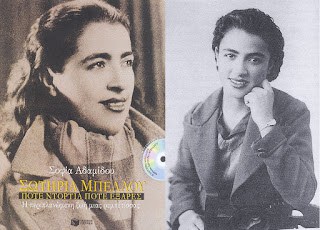Sotiria Bellou, a leading singer of traditional rebetika songs, often described as the Greek blues, was born in Halkida, Greece on August 22, 1921.
Ms. Bellou's turbulent life included a jail sentence for trying to blind her abusive husband by throwing acid in his face. She had married him against her father's wishes when she was a teen-ager and he was a bus conductor in the provincial town of Chalkida. Sentenced to three years in prison, she was released after only a few months. She never remarried.
When war was declared in 1940 and Italian and German troops invaded Greece, she moved to Athens and became involved in the Communist-led resistance. She was briefly jailed by both the Nazis and the nationalist Government forces in December 1944.
She taught herself to play the guitar and eventually began singing in public. As a child she had sung in a church choir under the guidance of her grandfather Sotiris, a parish priest whose name she adopted as her own.
Vasilis Tsitsanis, a popular composer and singer of rebetika music, saw her in a club and introduced her to the world of studio recordings. The success of her early disks encouraged her to try the rebetika style, which until then had been the province of male singers.

Over four decades, she produced scores of hits and many best-selling albums. She also toured widely, cutting a distinctive figure with her short-cropped hair and thick-rimmed eyeglasses. Her songs reflected her roots in poverty, and she soon became celebrated as a bard of the underprivileged.
Following her comeback on stage in 1966, she worked with Dionysis Savopoulos, Elias Andriopoulos and Dimos Moutsis.
In March 1993, she was affected by serious health issues and was diagnosed with pharynx cancer. She lost her voice and later died on August 27th, 1997, at the Metaxas Cancer Hospital in Piraeus.
The cancer eventually defeated her: she died in 1997. She was 76.

